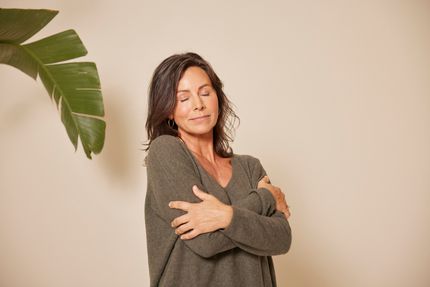Cold flashes and menopause
Hot flashes are a well-known symptom of menopause. When a hot flash strikes, you feel a sudden flare of heat and break into a sweat. Some women experience the opposite: you're chilled to the bone and it’s impossible to get warm. Like hot flashes, cold flashes are the result of hormonal changes that wreak havoc with your hypothalamus, the part of your brain responsible for regulating temperature. Why do cold flashes occur? And what can you do to reduce them?

Hot flashes are annoying, but cold flashes can be just as uncomfortable. When I get into bed, I simply can't get warm. Sometimes I lie awake shivering for hours! - Miranda (age 47)

Cold flashes are less discussed than their counterparts, hot flashes, but that sudden freezing cold feeling is also a symptom of menopause. In fact, many women report feeling cold regularly, and experts confirm that chills or cold hands and feet are a common symptom in women dealing with menopause. These so-called cold flashes can develop either all of a sudden or after a hot flash.
Cold flashes tend to be most common in perimenopause, the first stage of menopause before you’ve stopped menstruating, when hormone fluctuations are most extreme. The more dramatic the fluctuations, the greater the chance of symptoms such as hot flashes and cold flashes. After menopause, when your body has reached a new hormonal balance and oestrogen levels are consistently low, these temperature fluctuations usually even out. Have you reached menopause years ago and are still having hot flashes or chills? Then consult your GP.
What is happening in your body?
Much like hot flashes, cold flashes start in the thermoregulatory centre of the hypothalamus. This is the part of your brain that helps keep your body's internal functions, including body temperature, in balance.
Oestrogen has multifaceted effects on the hypothalamus. When oestrogen levels begin to fluctuate and fall during menopause, this can cause disruptions in the bodily functions regulated by the hypothalamus as well. Your brain's internal thermostat can become more sensitive and unstable, causing you to suddenly experience shivers and chills, or an intense feeling of heat. Or both, right after each other.
By the way, it's common for women to experience cold flashes at night. These chills can develop either all of a sudden or after a nocturnal hot flash (night sweat) in response to body cooling.
Other causes
There are also other factors that influence body temperature regulation. In addition to hormonal fluctuations, stress, restlessness and anxiety can also cause temperature dysregulation. When you're busy and in a constant state of being reactive, your cortisol levels rise. Elevations in cortisol levels can impact thermoregulation, potentially leading to changes in body temperature.
Certain medications, underlying health conditions or other menopausal symptoms (such as mood swings, hyperventilation and sleep problems) can also disrupt the body's ability to thermoregulate.
What can you do?
There are no rules for how often hot or cold flashes hit or how long they last. Episodes can last anywhere from 30 seconds to 10 minutes, sometimes longer. Some women spend the best part of the night shivering, chilled to the bone and unable to get warm. So, what can be done about cold flashes?
- Avoid alcohol, smoking and caffeine. This disrupts your body's temperature regulation. Try to cut back on caffeine and alcohol, and quit smoking.
- Sleep with socks on. Wearing socks in bed increases blood flow to your feet, which helps prevent cold flashes and cold feet.
- Do strength training two or three times a week. Muscle mass can influence body temperature. People who have more muscle mass also generate more heat. What’s more, physical activity relieves stress and tension, which in turn helps reduce fluctuations in body temperature.
- Try to limit stress in your life. Shifting hormones make you more sensitive to stress when you go through menopause. This can make juggling responsibilities more difficult. Set priorities and carve out moments in your day to rest and relax. Yoga, reading, mindfulness and breathing exercises are proven activities that help decrease overwhelm.
- Consider taking dietary supplements. Red clover has hormone balancing effects and contributes to a more stable body temperature*.
- Struggling with cold flashes all of a sudden? Get up and move around. Movement elevates your body temperature, allowing you to warm up faster.
*Health claims pending approval by the European Commission.
Your path to a smooth menopause starts here
Get the tools you need to navigate menopause with more ease and to educate yourself about your body. With tips and insights from experts, and relatable stories of women just like you. Press play, not pause.
What treatment is right for you?
Hormone replacement therapy (HRT) is used to treat severe symptoms of menopause, particularly hot flashes and night sweats. HRT has improved the quality of life of many women.
Can hormone therapy help?
Hormone replacement therapy (HRT) replaces lost hormones to counteract severe menopausal symptoms, such as hot flashes, sleep problems and mental health issues. For many women, HRT has been a lifesaver. Are you suffering from symptoms besides cold flashes? Then hormone therapy might be an option for you.
Sources
- Cleveland Clinic. (2020). Are Premenopausal Cold Flashes a Thing?. https://health.clevelandclinic.org/premenopausal-cold-flashes-real-thing
- Bansal R, Aggarwal N. (2019). Menopausal Hot Flashes: A Concise Review. PMID: 31001050.
- Lijuan Wang, Xiaoqing Ren, Xi Zhu, Wenhui Li, Jie Yang, Hui Zhang, Ji Yang, Haiguo Yin. (2023). Effects of body muscle and fat on differences in thermal preference. https://www.sciencedirect.com/science/article/abs/pii/S0360132323006704?via%3Dihub.
- Healthline. (2019). Should I Be Worried About Cold Flashes?. https://www.healthline.com/health/cold-flashes
Tips and advice


FAQ
What can I do if I have a cold flash?
Chills or cold flashes usually go away on their own after a few minutes. Do you feel cold a lot? Try to stay active, move around. Being physically active will increase your body temperature. Wearing multiple thin layers of clothing when you’re cold also helps to keep you warmer. Simply peel off those layers as your temperature increases.
Do I need to see my GP about cold flashes?
If you're having disruptive cold flashes, a trip to the doctor is recommended. By disruptive we mean if they are getting in the way of a good night’s rest or your social life. The doctor will be able to rule out an underlying cause. There are also plenty of options for treating your hot or cold flashes. Talk to your doctor about which treatment method is best for you.












